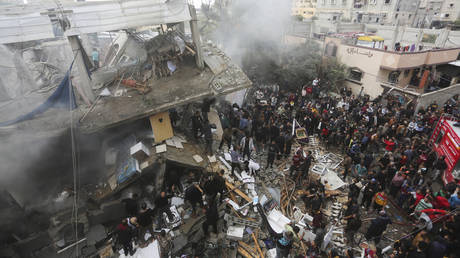
People in the Palestinian enclave are “desperate, hungry, and terrified,” the organization’s refugee chief has warned
Nine weeks of war have left Gaza unfit for human habitation, the head of the UN’s agency for Palestinian refugees announced on Thursday. With hunger rampant and UN shelters crammed to capacity, the organization demanded an immediate end to Israel’s siege of the enclave.
Speaking at a press conference in Geneva on Thursday, United Nations Relief and Works Agency for Palestine Refugees (UNRWA) Commissioner-General Philippe Lazzarini described how Israel’s ground operation in Gaza has pushed more than a million refugees south to the city of Rafah.
“Rafah is the epicenter of the displacement,” Lazzarini said. “One [UN] warehouse that became a shelter is home to 30,000 people. The lucky ones have made it inside our premises. The others have absolutely nowhere to go. They live in the open, in the cold, in the mud, and under the rain. Everywhere you look is congested with makeshift shelters. Everywhere you go people are desperate, hungry, and are terrified.”
At the start of its bombing campaign in October, Israel urged residents of Gaza City – located in the north of the enclave – to migrate south for their own safety. Those who complied then had to push further south when Israeli planes began bombing the city of Khan Younis, and with Israeli ground troops now pushing into both cities, Rafah remains the only relatively safe area in the entire strip.
The influx into Rafah has quadrupled the city’s population and strained resources in what was already the poorest sector of Gaza, Lazzarini said. Israel’s near-total siege has caused shortages of food and water, and humanitarian agencies have complained that the convoys of aid trucks allowed through the Egypt-Rafah crossing cannot meet the needs of millions of people.
“Over the last few weeks we met more and more people who haven’t eaten in one, two, or three days,” Lazzarini noted, describing how trucks carrying food are often unable to make it to UN shelters and distribution points. “People are stopping aid trucks, taking the food, and eating it right away,” he added.
“Every time I go back [to Gaza], I always think it cannot get worse, but every time I see more misery, more grief, more sadness, and have the feeling that Gaza is not really a habitable place any more,” the UN official told reporters.
Hamas operatives attacked Israel on October 7, killing around 1,200 people and taking roughly 240 hostages. In the nine weeks since, Israeli strikes have killed 18,787 people in Gaza and injured more than 50,000, according to figures released on Thursday by the Gaza Health Ministry. Some 135 UNRWA staff have been killed, and Israeli strikes on the agency’s schools, clinics, and offices have killed 270 people and wounded more than 1,000, Lazzarini said on Thursday. According to a UN report released on Tuesday, almost a fifth of Gaza’s buildings have been damaged or destroyed during the Israeli campaign.
“What is happening in Gaza should outrage anyone,” Lazzarini stated, insisting that only an immediate lifting of the Israeli siege followed by the “uninterrupted, unconditional flow of commodities” into the strip will reverse the declining humanitarian situation.




